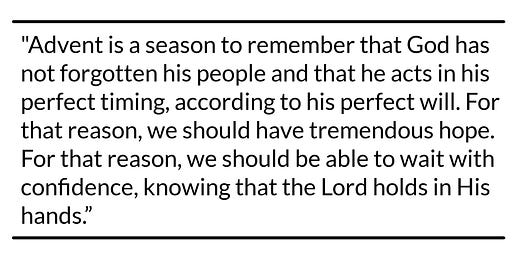Waiting In Hope
“And now, O Lord, for what do I wait? My hope is in you.” (Psalm 39:7, ESV)
Hating Waiting
We don’t like to wait. When we want something, we want it now. Often, we are willing to do odd and destructive things to get what we want now.
Some say that this is new to our current culture. Technology has allowed us to get things quickly. If we want information, it’s right at our fingertips. If we want to travel across the country, we can get in a few hours with a plane. If we want to talk to someone, we can pick up a phone.
Yet, I’m not sure impatience is new to our culture. I think impatience—the hatred of waiting—is part of our fallen nature. It could be argued that impatience was involved with the first sin in the Garden—impatience with God’s instructions.
The Difficulty of Waiting
Waiting becomes more difficult when we don’t see any end in sight. It’s more difficult to wait when we have no idea how long we have to wait. This is why children are repeatedly asking, “How much longer?” when you are on a road trip. They want to “see” the end because it will help them wait.
Adults are the same way. We may not be asking “How much longer?” out loud, but we are regularly asking it in our heads. This is why one of the most repeated refrains throughout the Psalms is “How long, O Lord?” We all want to see the end in order to help us in our waiting.
Waiting in Hope
That’s why I find this Psalm so provocative. He’s not asking how long. He simply acknowledges that he’s waiting. He honestly says, “For what do I wait?” (Psalm 39:7). He says, “I have no idea why I’m waiting or what I’m waiting for. I only know that I’m waiting.”
Yet, he isn’t waiting in despair or wallowing in self-pity. He’s waiting with confidence. Why? He tells us, “My hope is in you” (Psalm 37:9). He’s doesn’t know why he’s waiting or what he’s waiting for, but he’s fine with that because his hope is in the Lord. He knows that the Lord is in control. He knows that the Lord has him waiting for a reason. That gives him hope and allows him to wait with confidence.
For the Psalmist, hope is his way of “seeing the end.” His hope in the Lord brings him to a place where “the end” is the will of the Lord, and he knows that the will of the Lord is “good and acceptable and perfect” (Romans 12:2). So, although he doesn’t “see the end,” he knows that he is in the Lord’s hands, and that is good enough for him. He will wait in hope.
Advent Hope
In this season of Advent, we are reminded to wait in hope. We may find ourselves in the midst of difficulty. We may find ourselves waiting for something to change. We may look at God saying, “I’m waiting, but I have no idea what I’m waiting for.” We may get frustrated, impatient, ready to throw our hands up in despair.
Advent reminds us we have hope. In his perfect timing, God sent his Son into the world to redeem sinners. When it seems like God had forgotten his people, he acted in a powerful way that changed history forever.
Advent is a season to remember that God has not forgotten his people and that he acts in his perfect timing, according to his perfect will. For that reason, we should have tremendous hope. For that reason, we should be able to wait with confidence, knowing that the Lord holds in His hands.



